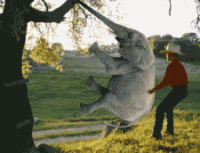Swine Flu
Swine influenza (also called swine flu, hog flu, and pig flu) is an infection of a host animal by any one of several specific types of microscopic organisms called "swine influenza virus". A swine influenza virus (SIV) is any strain of the influenza family of viruses that is usually hosted by (is endemic in) pigs.[2] As of 2009, the known SIV strains are the influenza C virus and the subtypes of the influenza A virus known as H1N1, H1N2, H3N1, H3N2, and H2N3. Swine influenza is common in pigs in the midwestern United States (and occasionally in other states), Mexico, Canada, South America, Europe (including the United Kingdom, Sweden, and Italy), Kenya, Mainland China, Taiwan, Japan and other parts of eastern Asia.[2]
Transmission of swine influenza virus from pigs to humans is not common and does not always cause human influenza, often only resulting in the production of antibodies in the blood. The meat of the animal poses no risk of transmitting the virus when properly cooked. If transmission does cause human influenza, it is called zoonotic swine flu. People who work with pigs, especially people with intense exposures, are at increased risk of catching swine flu. In the mid-20th century, identification of influenza subtypes became possible, this allows accurate diagnosis of transmission to humans. Since then, fifty confirmed transmissions have been recorded, Rarely, these strains of swine flu can pass from human to human. In humans, the symptoms of swine flu are similar to those of influenza and of influenza-like illness in general, namely chills, fever, sore throat, muscle pains, severe headache, coughing, weakness and general discomfort.
As the swine influenza A (H1N1) virus is a new virus, no swine flu vaccine is available to prevent infections.
And unfortunately, the seasonal flu vaccine that many of us receive will not provide any protection against the swine flu virus.
Experts are already working on a swine flu vaccine though. The CDC has already provided a candidate vaccine virus to several laboratories and manufacturers so that they can produce pilot lots of swine flu vaccines that can be tested to make sure they are safe and effective.
It is important to note that the decision to make a swine flu vaccine is separate from the decision as to whether or not to recommend that people actually receive the vaccine. Experts will likely still have to see what happens throughout the rest of the summer to see if they will recommend that people get a swine flu vaccine.
Wednesday, November 4, 2009
Subscribe to:
Post Comments (Atom)

No comments:
Post a Comment